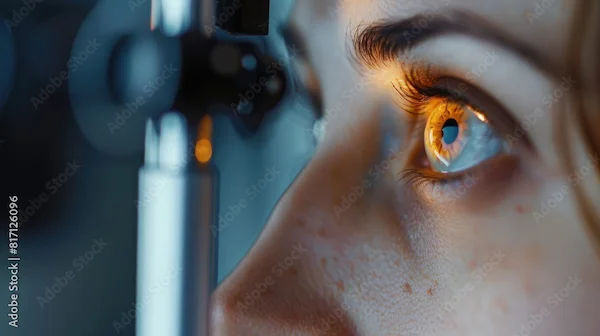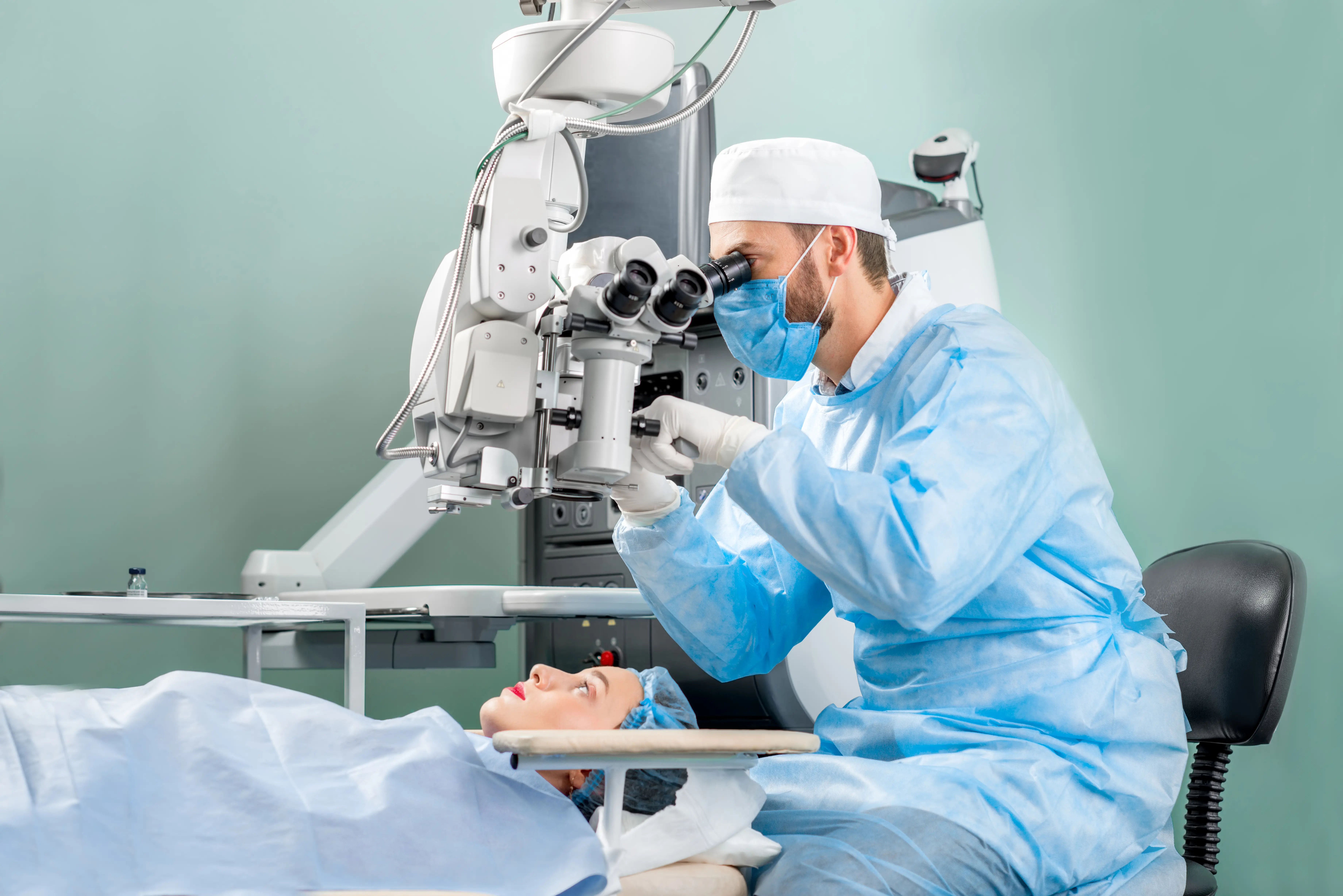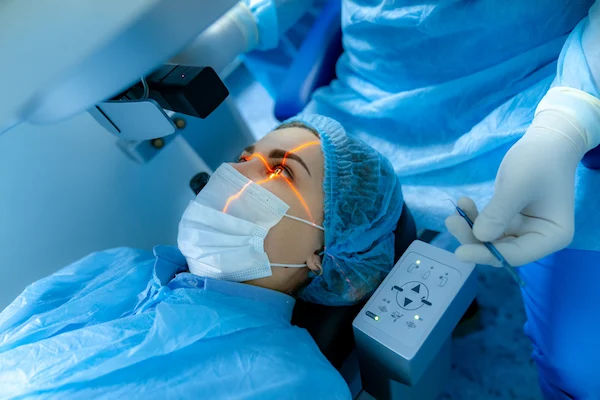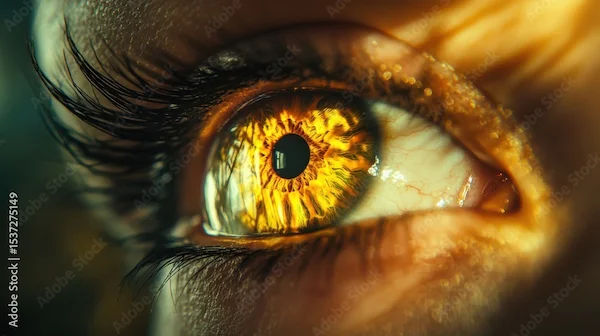Blood In White Of Eye After Cataract Surgery
Understand why blood may appear in the white of the eye after cataract surgery. Learn about causes, recovery, and when to seek medical attention for a safe healing process.

Written by
Last updated on 13th Jan, 2026

Introduction
Cataract surgery is a common and generally safe procedure that helps restore clear vision by replacing a cloudy lens with an artificial one. However, some patients may notice blood in the white of the eye (subconjunctival haemorrhage) after the surgery. While this can look alarming, it is usually harmless and resolves on its own.
In this article, we’ll explain why this happens, what symptoms to expect, when to seek medical help, and how to care for your eye during recovery.
Why Does Blood Appear in the White of the Eye After Cataract Surgery?
A subconjunctival haemorrhage occurs when tiny blood vessels under the clear outer layer (conjunctiva) of the eye break, causing a bright red patch. This can happen after cataract surgery due to:
Minor trauma during surgery: The eye is delicate, and even gentle handling can cause small blood vessels to rupture.
Increased eye pressure: Temporary pressure changes during surgery may lead to bleeding.
Blood-thinning medications: If you take aspirin or blood thinners, you may be more prone to this type of bleeding.
Coughing or straining: Vigorous rubbing, sneezing, or heavy lifting after surgery can contribute to bleeding.
The good news is that this condition is not painful and does not affect vision.
Symptoms to Expect
If you have a subconjunctival haemorrhage after cataract surgery, you may notice:
A bright red or dark patch on the white part of the eye.
No pain or discomfort (unless there’s an underlying issue).
No changes in vision.
The redness may look worse in the first few days but will gradually fade over 1-2 weeks, much like a bruise on the skin.
Consult Top Specialists for Personalised Tips
When Should You Be Concerned?
While subconjunctival haemorrhage is usually harmless, contact your doctor immediately if you experience:
Severe pain (not just mild irritation).
Vision changes (blurriness, flashes, or floaters).
Increased redness, swelling, or discharge (signs of infection).
Bleeding that worsens or doesn’t improve after 2 weeks.
These could indicate complications like infection, increased eye pressure, or retinal issues that need prompt treatment.
How to Care for Your Eye After Surgery?
To help your eye heal faster and prevent further bleeding:
1. Do’s:
Use prescribed eye drops: Follow your doctor’s instructions for antibiotic and anti-inflammatory drops.
Protect your eye: Wear a shield at night to avoid accidental rubbing.
Rest your eyes: Avoid straining, heavy lifting, or bending over for a few days.
Apply a cold compress: If there’s mild swelling, a clean, cold cloth can help.
2. Don’ts:
Rub your eye: This can worsen bleeding or cause infection.
Strain or lift heavy objects: Wait at least a week before resuming strenuous activities.
Swim or expose your eye to dust/dirt: Keep water and irritants away for a few weeks.
When Will the Redness Go Away?
Most subconjunctival haemorrhages clear up within 1-2 weeks without treatment. The red patch may change colour (yellow or brown) as it heals, similar to a fading bruise.
If the redness persists beyond 3 weeks, consult your eye doctor to rule out other issues.
Can This Be Prevented?
While some bleeding is unavoidable, you can reduce the risk by:
Informing your surgeon about blood-thinning medications before surgery.
Avoiding vigorous activities right after the procedure.
Following post-op care instructions carefully.
Conclusion
Seeing blood in the white of your eye after cataract surgery can be unsettling, but it’s usually nothing to worry about. With proper care, the redness will fade on its own. However, if you experience pain, vision changes, or worsening symptoms, seek medical attention right away. If you have concerns about your recovery or need follow-up care, Apollo 24|7 makes it easy to book an online consultation or schedule an eye check-up.
Consult Top Eye Surgeon
Consult Top Specialists for Personalised Tips

Dr. Atheeshwar Das
Ophthalmologist
15 Years • MBBS,DO,DNB(Gold Medal),FRCS(Glasgow),FICO(UK),
Chennai
Apollo Speciality Hospitals OMR, Chennai
Dr. Ashu Agarwal
Ophthalmologist
24 Years • MBBS, MS
Delhi
Apollo Hospitals Indraprastha, Delhi

Dr. Smriti Nagpal
Ophthalmologist
13 Years • MBBS , MS (Ophthalmology)
New Delhi
Sunshine mediclinic, New Delhi

Dr. Zennat Tajmin Shah
Ophthalmologist
24 Years • MBBS,DO,DNB (ophthalmology), Vitreo Retina Surgeon
Kolkata
Titanium Eye Care, Kolkata
Dr. Padmini S
Ophthalmologist
4 Years • MBBS,MS
Bengaluru
Apollo Medical Center, Marathahalli, Bengaluru
Consult Top Eye Surgeon

Dr. Atheeshwar Das
Ophthalmologist
15 Years • MBBS,DO,DNB(Gold Medal),FRCS(Glasgow),FICO(UK),
Chennai
Apollo Speciality Hospitals OMR, Chennai
Dr. Ashu Agarwal
Ophthalmologist
24 Years • MBBS, MS
Delhi
Apollo Hospitals Indraprastha, Delhi

Dr. Smriti Nagpal
Ophthalmologist
13 Years • MBBS , MS (Ophthalmology)
New Delhi
Sunshine mediclinic, New Delhi

Dr. Zennat Tajmin Shah
Ophthalmologist
24 Years • MBBS,DO,DNB (ophthalmology), Vitreo Retina Surgeon
Kolkata
Titanium Eye Care, Kolkata
Dr. Padmini S
Ophthalmologist
4 Years • MBBS,MS
Bengaluru
Apollo Medical Center, Marathahalli, Bengaluru




